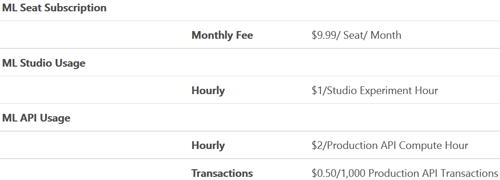News
Microsoft Azure Machine Learning Hits General Availability
- By Gladys Rama
- February 18, 2015
Microsoft's browser-based predictive analytics service, Azure Machine Learning (ML), is now generally available, the company announced on Wednesday.
Azure ML was released as a preview last July. Now that the service is generally available, that preview pricing (see below) will continue to be effective only until the end of March, according to the Azure ML pricing page.
 [Click on image for larger view.]
[Click on image for larger view.]
Starting on April 1, Azure ML pricing will switch to the below structure:
 [Click on image for larger view.]
[Click on image for larger view.]
There is also a free Azure ML tier, though it is limited to 10GB of storage and is capable of running smaller machine learning models than the for-pay Standard tier.
Based on Microsoft's Azure public cloud infrastructure, Azure ML is designed to give businesses and partners a way to analyze large amounts of historical data to forecast trends, even if they do not have machine learning expertise. Azure ML users have access to a library of pre-existing predictive analytics experiments -- including modules and algorithms -- that they can customize for their particular businesses. Building these experiments in the main Azure ML workspace area mostly requires simple drag-and-drop maneuvers. Users can also easily upload their existing datasets to Azure ML, which supports multiple file formats.
This Channel 9 video demonstrates how users can set up a machine learning experiment in Azure ML.
Azure ML users can deploy finished machine learning experiments as fully managed Web services in as little as a few minutes, according to Microsoft. In contrast, traditional machine learning models may take weeks or months to stand up, and require highly skilled personnel with predictive analytics backgrounds.
"We built Azure Machine Learning to democratize machine learning. We wanted to eliminate the heavy lifting involved in building and deploying machine learning technology and make it accessible to everybody," said Joseph Sirosh, Microsoft's corporate vice president of information management and machine learning, in Wednesday's announcement.
Sirosh gave an overview of new features in Azure ML, including support for Python and the R statistical computing platform, the ability to update existing machine learning models with new data, and access to finished experiments aimed at "common machine learning applications" in the Azure Store.
In addition, the general availability release adds support for "tools such as iPython Notebook and Python Tools for Visual Studio along with Azure Machine Learning. And there are new capabilities for data reading and transformation, a module for SQLite support, and new learning algorithms such as Quantile Regression," according to Sirosh.